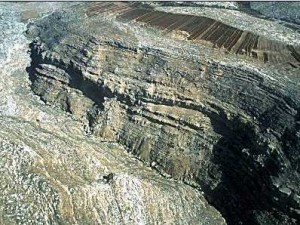In ancient Israel, warfare was the normal experience of young and old, rich and poor. During Saul’s reign, the Philistines were Israel’s great enemy who had dominance over the Israelites to the degree that no one in Israel was able to sharpen his weapons except by paying the Philistines. The Israelites were feeble before the Philistines. In one battle episode in which the Philistines rise up against the Israelites, Saul blows the trumpet to call out the people for battle. But Saul is barely able to hold together an army let alone a resolute army, with the men fleeing and hiding in holes and caves; and at Gilgal (Saul’s home base) “all the people followed him trembling” (1 Samuel 13:7). The Philistine army on the other hand is prepared and confident, maybe even dazzling in their numbers and armaments.
“And the Philistines mustered to fight with Israel, 30 thousand chariots and six thousand horsemen and troops like the sand on the seashore in multitude.” (1 Samuel: 13:5)
As an aside, it’s not possible that the Philistines could have had 30 thousand chariots (!), a staggering number that was probably the result of a copy error, lol. The number of chariots was probably in the 3000 range and even then there is a mismatch of strength with the Israelites like farmers with pitchforks in comparison. According to 1 Samuel 13:22, “…on the day of battle there was neither sword nor spear found in the hand of any of the people with Saul and Jonathan, but Saul and Jonathan his son had them.”
It’s in such dire circumstances that Saul is called to stand fast and wait upon God. During this time and in previous generations the Israelite army fought with the Ark of the Covenant (and the priest) on the battlefield. The priest’s role seems to have been to give the green light to engage in any particular battle. The priest stirred the men to action and strengthened their faith to believe that God would give them victory. The Israelites’ greatest strength and deliverer was God, Yahweh, who supernaturally delivered them in battle through certain leaders, even such as Saul.
1“When you go out to war against your enemies, and see horses and chariots and an army larger than your own, you shall not be afraid of them, for the LORD your God is with you, who brought you up out of Egypt. 2And when you draw near to battle, the priest shall come forward and speak to the people 3and shall say to them, ‘Hear, O Israel, today you are drawing near for battle against your enemies: let not your heart faint. Do not fear or panic or be in dread of them, 4for the LORD your God is he who goes with you to fight for you against your enemies, to give you the victory.’” (Deuteronomy 20:1-4)
Faced with his men fleeing as the Philistines mustered for battle at Michmash, Saul succumbs to fear and takes emergency action. Saul breaks the chain of command: he willfully “offers the burnt offering” to petition God for victory though he was not sanctified for this role. It may be difficult for us to grasp why this is a serious transgression but Saul should have known the severe consequences of doing things that only priests and certain anointed individuals like Samuel had authority to do, given history. If he had reverence for God’s commands (in this instance by way of Samuel), Saul would have waited and submitted to God’s word even if the world was going up in flames before his eyes.
Saul had a casual way with God’s commandments. Why does God demand Saul obey His word? Obedience despite not knowing why and despite the life and death pressure to take matters into one’s own hands indicates faith, reverence and “the fear of the Lord.” Saul started out with a bright future but along the way he succumbed to the fear of man.
What is God looking for? He is looking for total worship. We see something akin to total worship in Jonathan, Saul’s son, through his spectacular and God-glorifying faith as described in 1 Samuel 14.
6Jonathan said to the young man who carried his armor, “Come, let us go over to the garrison of these uncircumcised. It may be that the LORD will work for us, for nothing can hinder the LORD from saving by many or by few.” 7And his armor-bearer said to him, “Do all that is in your heart. Do as you wish. Behold, I am with you heart and soul.” (1 Samuel 14:6-7)
Jonathan has a laser beam faith which betrays no hint of uncertainty. I wouldn’t even describe it as faith but as knowledge that comes by way of knowing and having encountered the living God. Actually, many of the Israelites would have had this type of faith, including Saul. For if the visceral presence of God was in the camp and the glory of God manifested on occasion, then they would have lived in the reality that they are not their own. The key difference is that Jonathan worshipped while Saul’s missteps betrayed a careless and what was in fact a rebel heart.
So Jonathan was given the privilege of witnessing God’s faithfulness and thrilling deliverance as God intervened from the heavens, so that by two men and an earthquake the Philistines camp was thrown into chaos. The pitchfork contingent overran the tech-heavy thousands: God testified yet again He alone is God and is to be worshipped.
A fascinating detail about Saul not being able to chase after the fleeing Philistines without the priest first “withdrawing his hand” confirms the strict adherence to spiritual protocols in warfare.
In this narrative there is an obvious contrast between Saul and his son Jonathan so that we understand who God is and the type of man He is looking for. The narrative builds a case for Saul’s deficiency and sets up the subsequent rise of David as a man after God’s own heart. And David as we know is a foreshadowing of the only true worshipper of God, Jesus Christ.

